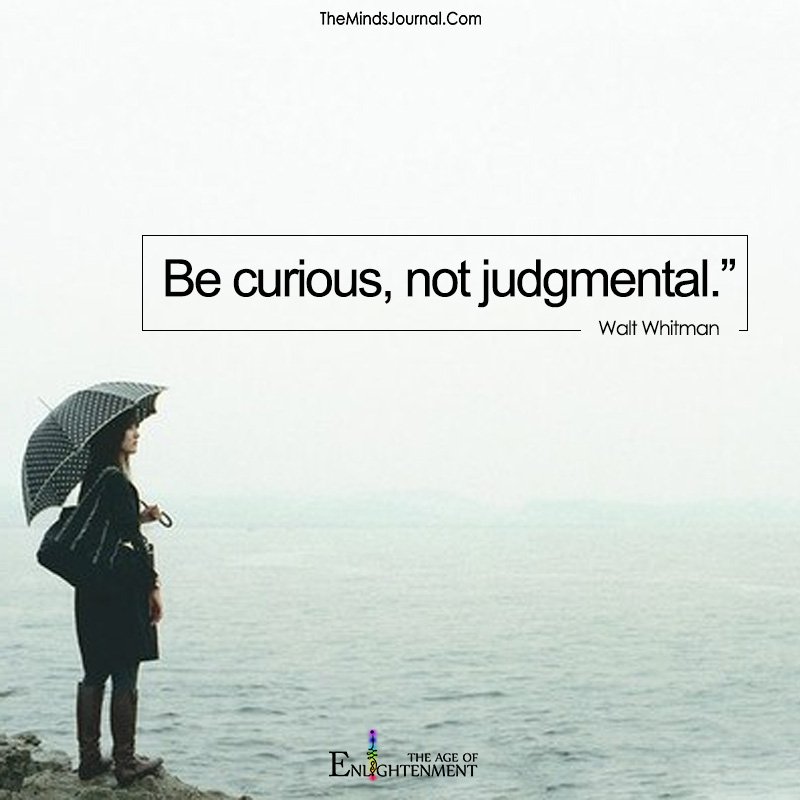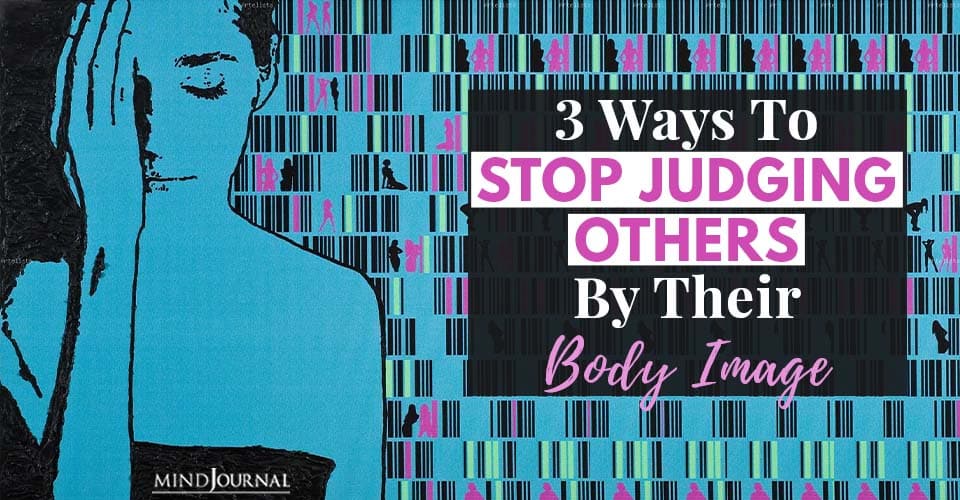A long time ago, I wrote a blog post on one of my favourite body image “tricks.” My super-secret trick was, in short, to stop judging the bodies of other people. Here’s a 3-step guide to stop judging others.
What Makes This Trick so Effective?
Every single time you make a negative judgement of someone else for something, you re-affirm for yourself the fact that you live in a world where everyone judges each other all the time, and that you’re in constant danger of messing shit up without realizing it.
You also affirm that there is a “right” and “wrong” way to be a woman, to have a body, to dress, to look, to exist.
This is a shitty message to keep affirming for yourself, and the more you do it, the more paranoid and self-conscious you get about all the possible ways you could be doing things wrong. This habit is bad for confidence, peace of mind, and yes– body image.
Hence, the less you think judge-y thoughts about other people, the easier it is to relax and stop judging yourself. I mean, think about how you feel when someone you’re spending time with says something judgy about another woman.
If you’re like most people, you have two responses.
The first response is a little thrill of exclusivity because your friend has chosen you to confide her judgement in, thereby exempting you from the judgment. This means you’re momentarily safe. Also, being the judger instead of the judgee is like feeding your ego a cookie. It wakes up and gets all excited, like YEAH MOTHERFUCKER, I’M SPECIAL!
This feels good because being special brings with it a particular kind of pleasure. Unfortunately, the second response is often a bit more subtle, and a lot less pleasant.
The second response is a constriction, often felt in the form of an unpleasant emotion like disgust or anger. Have you ever noticed how judging someone brings up something not-very-nice inside us? That’s because the ego feeling special is always a zero-sum game: you can only be special if someone else isn’t, you can only be right if someone else is wrong.
Read How To Help A Partner Struggling With Body Issues and Insecurities
Sometimes the thing that gets awakened when you’re being judge-y is the same nasty “ugh, ew” part of us from middle school, or sometimes it’s outrage disguised as concern, like “I just don’t understand why she doesn’t lose weight!”
Either way, you’ll usually feel an emotion that brings with it a tightness, an unpleasantness, or a defensiveness.
This is because you have just affirmed for yourself that everyone is constantly judging each other and that the world is a place of scarcity and competition, in which you must always be striving to be different and better in order to get your due. If you (an obviously good person) are so judgmental, then everyone else must be as well. Deep in your subconscious, this fact feels yucky.
Somewhere deep down you tighten your grip on making sure nobody can judge you. Something inside you resolves a little harder to be likeable, and reasonable, and to do everything RIGHT so that you can’t be the target of judgement.

I assure you, everyone does this. Judgement is the result of an evolutionary gift– thanks to our evolved brains, we get to decide for ourselves what we think about everything, which is cool! Because of this, however, humans are constantly coming up with stories about everything, as though it was our job to decide if every single moment is good, or bad, or right, or wrong. We want to categorize everything into either “I like this” or “I don’t like this.”
When it comes to body image and self-esteem, judging everything this way leads to nothing but fear, pain, and unhappiness.
But you probably know this already.
Maybe you’ve read articles on TinyBuddha and the spiritual path has convinced you to stop judging others. Maybe you want to lessen anxiety, or you’re coming at this from a body image perspective, and want to love yourself more. Maybe you just want to be a more compassionate person.
No matter what your reason for trying to stop being so judge-y, the obvious next question is… how?
Your Path to a Judgement-Free Life
What I’m about to tell you is incredibly simple, but I assure you it’s not easy. If you’ve been practicing judging other people your whole life, then it’s going to take an absolute ton of practice, patience, and dedication to create a brand new habit.
But that’s exactly what you need to do. Instead of just trying to quit cold turkey, you need to replace your old habit with a new one:
The habit of checking in with what’s going on inside you that caused you to judge someone.
Simple, right? Sure. But let’s take a look at how that actually works in practice:
Step 1: Become aware of when you’re judging someone.
You’re not going to be able to succeed at step 2 or 3 until you manage to identify and catch yourself every time you judge someone. Sometimes keeping a judgement journal can be extremely useful for this step, where you write down every single negative judgement you make about anyone throughout the day.
Read 4 Effective Ways To Deal With Judgment And Judgemental People
Step 2: Interrupt the pattern.
Our brains are good at doing what they’ve practiced doing. If you’ve been judging people a lot, you’re going to have to interrupt that mental pattern in order to stand any chance of changing it. This interruption is called cognitive dissonance, and can take place the moment you notice yourself judging someone, as long as you do something– anything— different.
Some people have luck saying the word STOP outloud, or picturing a big red stop sign, as soon as they catch themselves having a judge-y thought. Other people prefer to do something completely random and weird in order to interrupt the mental pattern, like reciting the alphabet backwards, or doing a weird dance, or picturing a purple elephant.
Whatever works for you is fine. The goal is to simply interrupt the old mental pattern. By interrupting it, you create the space for something new to happen, and new (non-judge-y) thoughts to show up.
Read Healthy Shame And Toxic Shame: How Do We Live With It
Step 3: Bring it back to yourself.
Take total responsibility, and bring the judgement back to yourself. Ask questions that take responsibility for your judgement, like “what about me right now is making me feel this way?” or “what’s going on with me that I’m judging this person for this thing?”
The truth is, when you judge someone it’s always about you; it’s never about them.
Explore your role in the judgement with curiosity instead of judgement. We often judge the stuff we wish we could do but don’t, for whatever reason, and there’s a lot to learn from the stuff that triggers judge-y thoughts.
If you have kids for example, and you spend a lot of energy making sure they don’t bother other people in public, then seeing a mom who lets her kids run around and cause mayhem might be a huge judgement trigger for you. Or if you decided a long time ago that you “can’t” wear mini skirts with your big legs, then seeing another big-legged woman wearing a miniskirt might make you feel real judge-y.
By gently questioning what’s going on for you that’s causing your judginess, you have the opportunity to learn a ton about yourself– possibly even including some ways in which you’d like to act differently!
Try these three steps and see how it goes. You might not like how it feels to be under scrutiny at first, but I promise that by habitually taking responsibility for your role in your judgement, you will both improve your own life through better self-awareness, and you’ll find yourself judging other people less.
Which in turn means you’ll feel safer, more comfortable, and more relaxed to be yourself: win/win!
Are you ready to practice how to stop judging others?
Written by: Jessi Kneeland
Originally appeared on: Jessikneeland.com
Republished with permission.










Leave a Reply